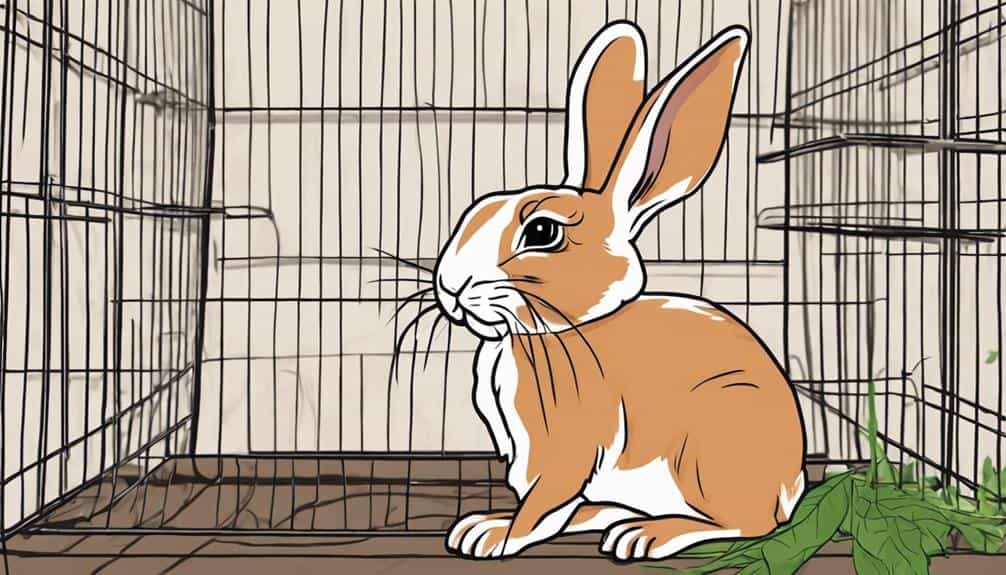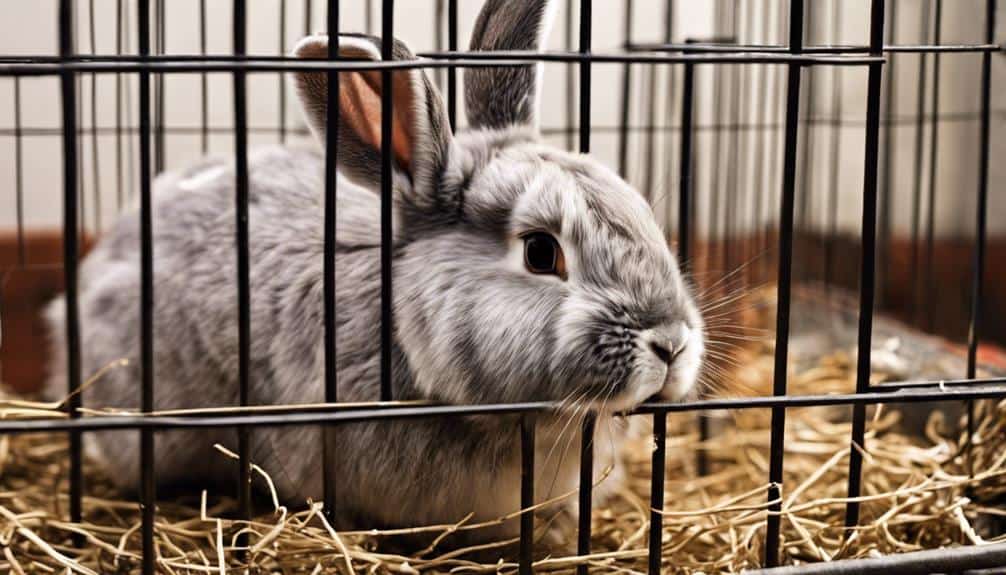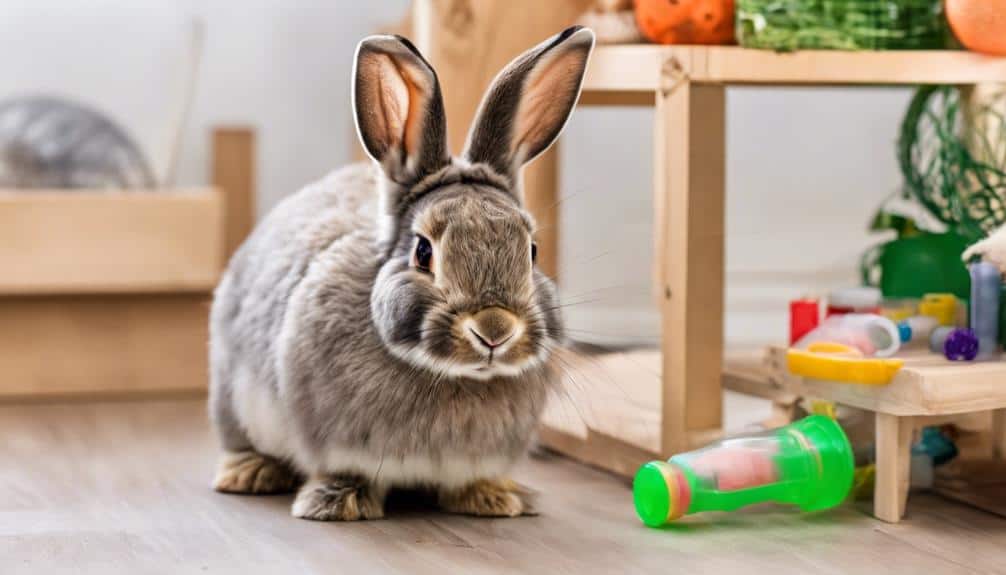When your pet rabbit starts speaking a silent language of stress, it's important to decipher their cues to guarantee their well-being. From subtle signs like withdrawn behavior to more overt actions such as aggression, your bunny might be communicating distress.
But what lies beneath these actions? Understanding the intricacies of your fluffy companion's stress indicators can reveal a world of insights into their needs and emotions. By unraveling these signals, you can build a stronger bond with your rabbit and cultivate a harmonious environment for them to thrive.
Contents
Key Takeaways
- Changes in eating habits can indicate stress in pet rabbits.
- Understanding your rabbit's body language helps identify stress.
- Providing ample space and enrichment activities reduces stress levels.
- Consistent social interactions and routines are crucial for minimizing stress in rabbits.
Environmental Stressors for Rabbits

When considering environmental stressors for rabbits, inadequate cage size plays a significant role in causing stress, leading to behavioral issues and health problems. Rabbits need space to move around, stretch, and exhibit natural behaviors.
Changes in eating habits can also indicate stress in rabbits. Ensuring access to fresh hay and a balanced diet is important for their well-being. Rabbit enrichment is necessary to prevent boredom and stress. They thrive when given opportunities for exploring their environment and engaging in activities that stimulate their minds.
Loud noises can be distressing for rabbits, as they're sensitive animals. Providing areas where rabbits can hide away can help them feel secure. Overall, creating a comfortable and enriching environment for rabbits is essential in reducing stress and promoting their health. By addressing these environmental stressors, you can enhance the quality of life for your pet rabbit.
Social Stressors and Bunnies
Addressing social stressors in rabbits involves understanding their natural behaviors and social structures, which can help in creating a harmonious environment for these sensitive animals. When considering social stressors in rabbits, it's important to be aware of factors such as lack of space, the loss of a mate, introducing a new cage mate, and the importance of consistency in daily habits.
To guarantee the well-being of your bunny, here are some essential tips to minimize social stress:
- Provide enough space for your rabbit to move around freely.
- Be mindful of any changes in the social group dynamics, especially when introducing a new cage mate.
- Establish a consistent daily routine to help your rabbit feel secure and reduce stress.
- Offer mental stimulation and environmental enrichment to keep your rabbit engaged and content.
Mental Stressors in Pet Rabbits

To understand mental stressors in pet rabbits, it's essential to recognize the impact of environmental factors on their well-being. Rabbits are highly sensitive creatures that can easily become stressed when their environment lacks mental stimulation and enrichment.
Changes in their daily habits and schedules can also trigger stress in rabbits, leading to emotional turmoil. Understanding their natural behaviors and social structures is important in addressing and preventing mental stress in pet rabbits.
Providing consistent social interactions and opportunities for mental stimulation can greatly help alleviate mental stress in rabbits. It's important to create an environment that supports their natural instincts and behaviors, offering enrichment activities that keep their minds engaged and active.
Understanding Your Rabbit's Behavior
Understanding your rabbit's behavior starts with observing their body language and daily habits for signs of stress. When it comes to rabbits, who are social animals and prey animals by nature, their behavior is a key indicator of their mental state. Here are some important points to take note of:
- Rabbits Body Language: Pay attention to flattened ears, tense posture, or excessive grooming, as these can be common signs of stress.
- Changes in Behavior: Any sudden changes in eating habits, grooming routines, or social interactions could signal that your rabbit is feeling stressed.
- Normal Rabbit Behaviors: Understanding typical rabbit behaviors like thumping or hiding can help you recognize deviations that may indicate stress.
- Appetite Changes: Rabbits may lose their appetite when stressed, so monitoring their food intake is important for evaluating their well-being.
Enrichment Strategies for Stressed Bunnies

Implementing engaging activities and providing a stimulating environment can effectively reduce stress levels in rabbits. Stressed bunnies may exhibit behaviors like over-grooming, teeth grinding, or hiding in their enclosure.
To help them feel happy and safe, consider offering enrichment options such as puzzle feeders, treat balls, and interactive toys. These activities can engage your rabbits, stimulate their minds, and prevent boredom. Interactive toys like tunnels, cardboard boxes, and chew toys are great choices to keep your rabbits mentally active and alleviate anxiety.
Rotating toys and rearranging their living space regularly can prevent habituation and maintain their interest levels. Additionally, creating a safe outdoor play area with tunnels, ramps, and hiding spots can provide rabbits with opportunities to explore and exercise.
Offering a variety of textures and materials for chewing can also help promote dental health and satisfy their natural chewing instincts, which can positively impact their appetite and overall well-being.
Frequently Asked Questions
Do Rabbits Get Stressed Easily?
Rabbits can get stressed easily due to their sensitive nature. Changes in their environment, routine, or social interactions can trigger stress swiftly. Understanding stress triggers and promptly addressing behavioral changes is crucial for your rabbit's well-being.
How Do You Know if Your Rabbit Is Upset?
When your rabbit is upset, watch for behavior changes like hiding or aggression. If they avoid you, lose weight, or overgroom, they might be stressed. Take action by removing triggers and consulting a vet.
What Are Indicators of Pain in Rabbits?
If your rabbit is in pain, watch for behavioral changes, physical symptoms, loss of appetite, hiding behavior, aggressive tendencies, excessive grooming, changes in vocalization, destructive behavior, avoidance of interaction, and restlessness. These signs may indicate discomfort.
How Do I Know if My Rabbit Is Traumatized?
To understand if your rabbit is traumatized, observe behavioral changes like aggression or excessive grooming, physical symptoms like loss of appetite or changes in sleeping patterns, and trust issues reflected in withdrawn demeanor or hiding behavior.
What Are the Most Common Signs of Stress in Pet Rabbits?
Recognizing stress signs rabbits is crucial for pet owners. Common signs include loss of appetite, excessive grooming, aggression, or hiding. Changes in behavior, such as thumping, teeth grinding, or excessive lethargy, can also indicate stress. It’s important to monitor your rabbit’s behavior and seek veterinary advice if you notice these signs.
Conclusion
To sum up, recognizing and addressing stress in your pet rabbit is vital for their well-being.
By understanding the various environmental, social, and mental stressors that can affect rabbits, you can take proactive steps to create a safe and enriching environment for your furry friend.
Remember, a happy and stress-free rabbit is a healthy rabbit.
Are you ready to make a positive change for your beloved pet?






